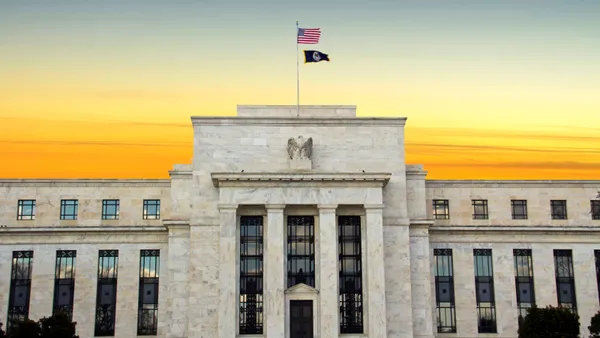Dive Brief:
- U.S. businesses use of digital wallets jumped last year, rising from 47% in 2022 to 62% in 2023, according to a report from the Federal Reserve’s financial services unit, which cited a survey it commissioned in the second half of 2023.
- Large businesses and those that provide services drove the change. Among service businesses, digital wallet usage increased from 43% in 2022 to 61% last year. Similarly, large businesses saw digital wallet usage jump from nearly half (48%) to nearly two-thirds (64%), the survey said.
- Meanwhile, the survey tracked slower ACH payment growth, rising from 40% in 2022 to 45% in 2023. For services businesses, ACH usage climbed from 39% in 2022 to 49% in 2023 while it rose for large companies from 44% to 51%, the survey found.
Dive Insight:
“Many businesses are implementing faster and instant payment services because the benefits they offer align with the qualities sought by today’s digital-first consumers,” the Fed report said. The central bank undertook the survey to explore businesses “payment behaviors, pain points and use cases,” according to the report.
The Fed survey showed that businesses use of faster payments systems, wire transfers, next-day ACH and debit cards also rose, but not as much as digital wallet use. By contrast, cash usage by businesses dipped.
The Federal Reserve’s survey builds on previous research suggesting that digital payments are overtaking more traditional payment methods. A report from merchant services provider Worldpay in March predicts that the value of point-of-sale debit transactions will decline from 28% in 2023 to 23% in 2027. Conversely, the report predicts that digital wallet usage will rise from 15% in 2023 to 31% in 2027.
However, consumers are likely to stick with just one digital wallet provider, from one of the major providers. Nearly a third of 1,800 U.S. consumers surveyed by the consulting firm McKinsey said they anticipate using a single digital wallet from tech giants like Apple, Google and Samsung, up from 21% in 2021. The proportion of people expecting to use three or more digital wallets fell from 30% to 20%.
But as tech giants are poised to dominate the digital wallet market, lawmakers and regulators are considering how best to oversee the industry. The Consumer Financial Protection Bureau last year proposed a rule that would subject digital wallet providers to the same oversight as banks, but the proposal has drawn criticism from trade groups, including the Electronic Transactions Association, the Financial Technology Association and the Crypto Council for Innovation. Members of Congress have written letters expressing concerns about the proposal.










